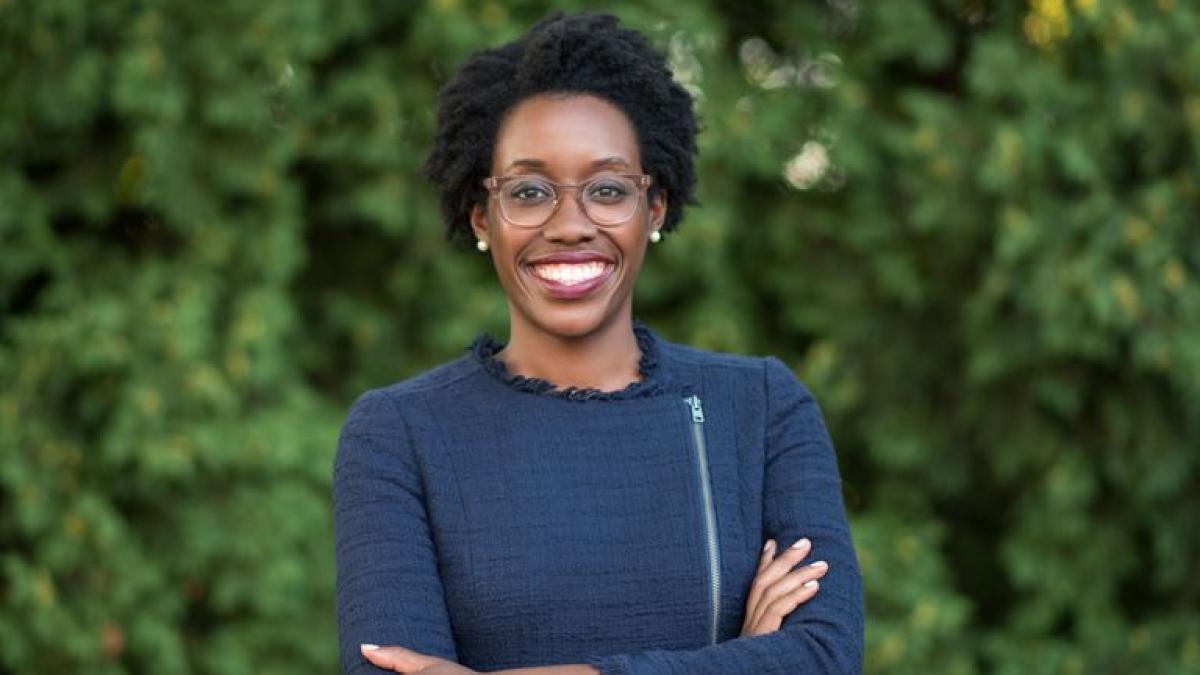Black Mothers Are Dying At Alarming Rates. Rep. Lauren Underwood Wants Congress to Do Something About It.

In February 2017, U.S. Rep. Lauren Underwood's close friend, Dr. Shalon Irving, died three weeks after giving birth to a baby girl. Irving, a lieutenant commander in the U.S. Public Health Service Commissioned Corps and an epidemiologist, was just 36 years old.
According to the Centers for Disease Control and Prevention, African American women are three to four times more likely to die of pregnancy complications than white women, irrespective of income or education. Those staggering numbers are why, on Tuesday, Underwood and Rep. Alma Adams announced the formation of a Black Maternal Health Caucus to assist in developing policies that combat the shockingly high black maternal death rate.
"It was personal for me," Underwood tells ELLE.com of starting the caucus, which she hopes will shed light on the epidemic.
"I'm the youngest black woman to ever serve in Congress and I'm the only black woman of reproductive age in the Congress, so I'm really happy to be able to be a leading voice on this important issue," she says. "[It's heartbreaking] and this can happen to anybody, because the factors that would protect other women, like being highly educated, a high income, living in a safe neighborhood, going to prenatal appointments, having health insurance, all of these different things do not protect black women the same way they do other groups."
To combat what she calls a "systems-level problem," Underwood and Adams came up with a systems-level solution. The Black Maternal Health Caucus has over 50 members, including Democrats like House Majority Leader Steny Hoyer, Majority Whip James Clyburn, and House Democratic Caucus Vice Chair Katherine Clark. Several Republicans have also joined, including Rep. Jaime Herrera Beutler, the lead sponsor of the Preventing Maternal Deaths Act.
Underwood says the caucus will come up with "creative" and "strategic" solutions to elevate black maternal health, which she calls a "unique issue."
"Other issues have full NIH institutes. There's a National Cancer Institute. There's a National Child Development Institute. We don't have that for this kind of a challenge," she says. "We have to be strategic and work with our partners, community groups, and clinicians to elevate programs that we know work. Then we have to see if there's models that we can develop to demonstrate projects, write and issue a bill, and give it a small pot of money. [We want to] see what works."
The U.S. has the highest rate of maternal mortality among developed countries, at a rate of 26.4 deaths per 100,000 births. American woman today are 50 percent more likely "to die in the period surrounding childbirth than their own mothers were," Dr. Neel Shah, assistant professor at Harvard Medical School and an OB-GYN at Beth Israel Deaconess Medical Center in Boston, tells ELLE.com. "But this deeply concerning and frankly frightening statistic is largely driven by experiences of black women. It reflects the differences in care and support they receive from the health system and from society at large compared to white women."
According to the latest data from the Centers for Disease Control and Prevention, there are 12.4 deaths for 100,000 live births for white women, compared to 40 deaths per 100,000 live births for black women.
"These deaths," Shah says, "are the canary in the coal mine of an even larger problem. For every death, there are thousands of black women who experience avoidable suffering in the form of illness, social isolation, and economic disempowerment in the period surrounding a birth."
The reasons, he explains, are complex. But one especially significant challenge is overcoming discrimination.
"As an obstetrician myself, it is uncomfortable to say this but there is clear evidence that when black women express medical concerns, particularly regarding pain, the health care system is slower to respond than it should be," Shah says. "This is the common thread in many of the prominent stories in the news of a black woman's experiences."
For Underwood, the issue is both personal and clinical. Even beforeIrving died in 2017, she was invested in black maternal health care. As an undergraduate at University of Michigan in 2008, she wrote her honors thesis on how to fix maternal mortality disparity by giving midwives expanded reimbursement rates.
"I was deeply disturbed by the maternal mortality disparity that African American women had and here we are many years later and it still exists," she says. "It's a problem for black women in America."
The caucus will work with Black Mamas Matter Alliance, an advocacy group that "shift[s] culture for black maternal health, rights, and justice," according to their site. The alliance reportedly provided a list of action items that they believe Congress should examine.
Underwood is especially excited to have people like Rep. Jamie Herrera Beutler as members of the caucus. The preventing maternal death bill she introduced last year will help fund state committees to review and investigate deaths of expectant and new mothers, which Underwood calls "a great first step."
"There's a variety of [similar] bills that have been proposed," she says. "[We] want to see those passed. We want them to get hearings. We want appropriation, dedicated dollars to study this issue."
"We have to start to tackle this issue," she adds, "elevate it as a problem that's worth solving and now we see that we have almost [many] members of Congress that say, 'Yeah, this is important. Let's work on it.'"